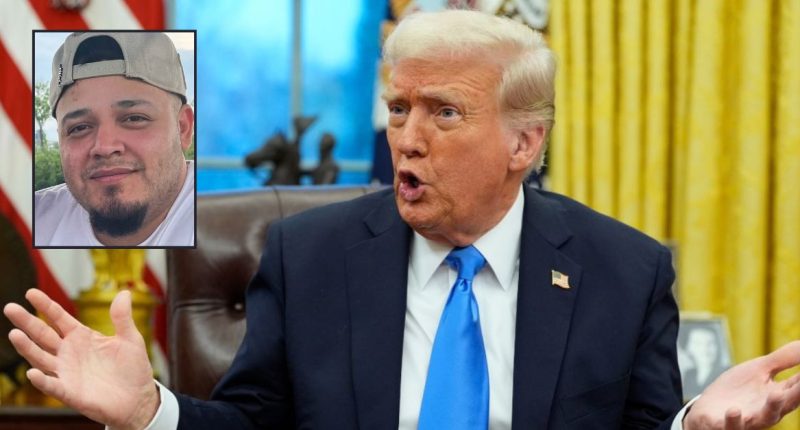Share this @internewscast.com
Inset: Kilmar Abrego Garcia appears in an undated photo (CASA). Background: President Donald Trump converses with reporters in the Oval Office at the White House, Tuesday, February 11, 2025, in Washington, D.C. (Photo/Alex Brandon).
Lawyers advocating for Kilmar Abrego Garcia submitted a motion on Monday, dismissing the Trump administration’s complaints regarding their client’s interactions with media outlets.
The criticisms, according to the defense attorneys, are unwarranted and bring attention to questionable tactics employed by the government in a case riddled with mistakes and irregularities.
“For several days now — and as detailed in numerous court filings over the past months — the government has openly shared information with the media, boasting about its imminent deportation plans for Mr. Abrego,” a detailed footnote in a concise motion reads. “It’s therefore astonishing — especially since the Attorney General of the United States declared in the Oval Office that Mr. Abrego would ‘no longer be a threat to our nation’ — to witness the government’s dissatisfaction over Mr. Abrego allegedly seeking media attention with ‘a public and incendiary filing.’ Really.”
This critique emerged on the same day the U.S. Department of Justice requested U.S. District Judge Waverly Crenshaw, Jr., appointed by Barack Obama, to prolong a significant deadline.
Abrego Garcia lodged a recent motion to dismiss the criminal allegations, arguing that he is being subject to vindictive and selective prosecution. He asserts that the human smuggling charges are retaliatory, stemming from his successful efforts to highlight the Trump administration’s controversial deportation policy, which led to his wrongful deportation to a feared terrorist prison in El Salvador.
In a court filing exactly one week ago, Abrego Garcia’s criminal defense lawyers alleged “high-ranking Executive Branch officials are retaliating against Mr. Abrego for fighting his removal and winning.”
Still, plea negotiations in the criminal case continued behind the scenes – until Abrego Garcia was released from jail over the weekend. Hours before that, the Trump administration allegedly began the process of trying to deport him to Uganda, a country in Africa.
“On Friday evening, the government informed Mr. Abrego that he has until first thing Monday morning — precisely when he must report to ICE’s Baltimore Field Office — to accept a plea in exchange for deportation to Costa Rica, or else that offer will be off the table forever,” a supplemental defense motion filed late Saturday reads. “There can be only one interpretation of these events: the DOJ, DHS, and ICE are using their collective powers to force Mr. Abrego to choose between a guilty plea followed by relative safety, or rendition to Uganda, where his safety and liberty would be under threat.”
The government clearly did not appreciate the defense sharing the details, at least as alleged, in that supplementary motion.
In their complaint, the DOJ says they were “operating under the impression that these plea negotiations were ongoing and being conducted in good faith by both sides.” That all ended when the defense portrayed those discussions and the government’s “actions in reliance” on them as “sinister and coercive,” the DOJ says.
The government went on to argue that the defense was presenting the details of the plea negotiations in a false light likely to be reported by the media. The DOJ also suggested the defense motion somehow attempted to mislead the court itself – all while the clock ticked down.
“[D]efense counsel’s misleading commentary on these discussions through a public and incendiary filing — apparently designed to garner the sort of media attention they have previously decried — raises the concern that this Court is now left with a misimpression of the true facts,” the government’s complaint continues. “More importantly, they have used the content of those negotiations as fodder for their vindictive prosecution motion and supplement to the same, which the Government now must respond to within a week.”
Abrego Garcia’s attorneys, for their part, criticized the government for complaining about “the dramatic landscape change” in the case, saying the only change was self-inflicted by the government in response to their client finally making bail in the Volunteer State.
“The ‘dramatic landscape change’ is, of course, the product of the government’s unilateral decision to arrest Mr. Abrego and notice his deportation to Uganda, thereby depriving him of the pretrial release ordered by this Court,” the latest defense motion argued. “The government should not now receive an extension to mitigate the consequences it caused.”
The aforementioned footnote elaborated on other things government officials have said and done in response to Abrego Garcia’s release.
“The feigned indignation hardly merits a response,” the defense attorneys argue. “But suffice it to say that Mr. Abrego’s statement of his position in a court filing is entirely proper, whereas the government’s prejudicial extrajudicial statements are not and have never been compliant with either this Court’s rules and rulings or the government lawyers’ ethical obligations.”
The court, however, seems content to let the arguments continue a bit longer – giving the DOJ a quick win of nearly two additional weeks. Before the defense filed its supplemental motion, the government had until Sept. 2 to respond. Now, the government has until Sept. 15.














